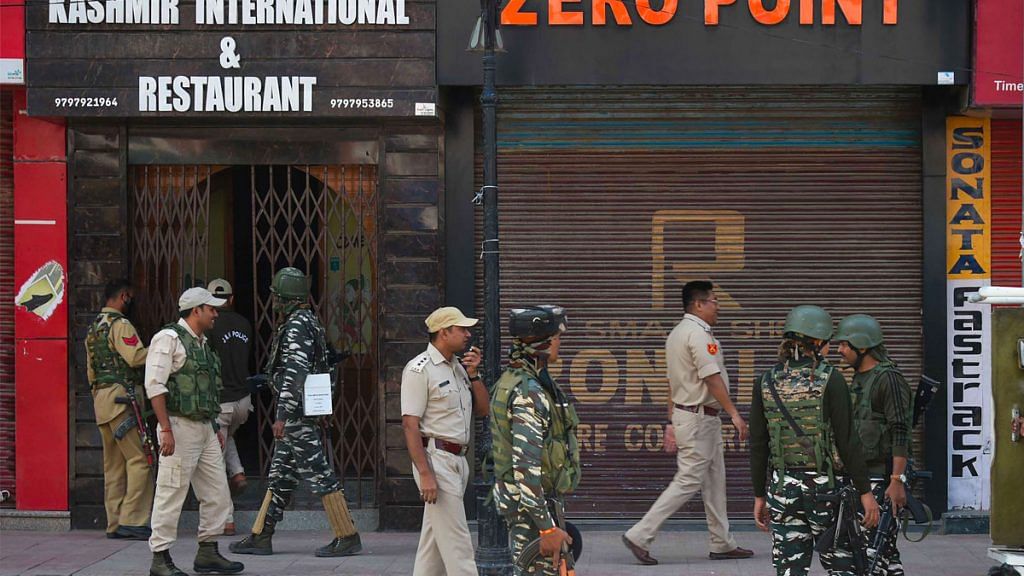Srinagar: A ‘people’s curfew’ seems to be taking shape in Kashmir as the Modi government eases restrictions imposed after the abrogation of Article 370, with shopkeepers keeping their shops shut, students staying away from schools, public transport staying off the roads and petrol pumps opening only for half the day.
Shutdowns have been a regular part of life in Kashmir since the heyday of the militancy in the 1980s-90s, with separatists frequently ordering shutdowns to protest against alleged state or Army excesses.
However, the one currently sweeping through the Valley appears to be a civilian initiative, gaining steam via word of mouth amid restricted communication services.
While the state government has refuted the possibility of a public-powered shutdown, local residents told ThePrint that they were mounting a boycott to invalidate the government’s bid to project “normalcy” in the Valley.
Shops
Shops and shopping complexes at the city centre, Lal Chowk, considered the heart of Srinagar, remained shut Wednesday, the 17th day since the abrogation of Article 370 and third since restrictions on civilian movement began to be eased over the weekend.
Most of the shopkeepers who spoke to ThePrint requested anonymity amid reports of massive arrests that have been carried out since 4 August to thwart unrest.
However, almost all of them admitted that a “civilian curfew” has begun in Kashmir.
“What they wanted to do, they did in the last three weeks,” said a stationer based at Lal Chowk. “Now it’s our turn.”
Zahoor Ahmed, who has a shop in Srinagar’s Jawahar Nagar area, added that the government’s lockdown was an “attempt to break us, that’s all”.
“They wanted to abrogate Article 370. That has been in the BJP’s manifesto ever since the party was formed,” he said. “There was no violence or protests when 370 was abrogated, so what is the meaning of blocking communications, arresting thousands?”
Another shopkeeper said, “The government wants to show everything is normal here. Even though there is a communication blackout, we will tell the world that things are not normal in Kashmir.”
ThePrint visited the offices of the Kashmir Chamber of Commerce, the main trade body of the Valley, to seek comment, but found the premises closed.
Schools
Government spokesperson Rohit Kansal announced Sunday that primary schools in Kashmir will reopen Monday. However, Kashmir director of school education Younis Malik told the media Monday evening that the attendance at schools was “thin”.
The state government claimed Tuesday, while announcing the opening of middle schools from Wednesday, that attendance had improved.
However, when ThePrint visited 19 schools Wednesday, they were all closed.
Waseem Kuchey, the secretary of JK Public School at Humhama, said they had not been able to contact their staff.
“Parents are hesitant to drop their wards at schools amid the snapping of communications,” he added. “We have also failed to contact our faculty.”
The school has 2,000 students and 250 employees.
The Kashmir Valley School, located at the highly-secure airport road, was shut as well, with only peons turning up Wednesday.
“No one is inside. Just us peons,” said one of the staffers.
Institutes in Lal Chowk, downtown Srinagar and other parts of the city, both primary and middle schools, haven’t opened either.
A parent out to check the status at Tyndale Biscoe, Srinagar’s oldest school, located near Lal Chowk, said, “I wouldn’t be at peace with my children at school when there is communication blackout.”
Kansal had said this week that they had received requests from parents to reopen schools. However, the government did not specify how the requests were received when most communication lines remain closed.
Also read: Article 370 gone, BJP now wants to make Jammu & Kashmir a religious tourism hub
Petrol stations
During all periods of civil unrest in Kashmir, in 2008, 2009, 2010 and 2016, petrol stations have remained closed during the day and opened only in the evening. The same thing is happening now.
Approached for comment, a staffer at a petrol pump downtown said, “There is a civilian curfew.” When asked who informed him, the staffer responded, “No one is opening their businesses or shops. That’s why we, too, remain closed during the day.”
Public transport
Nearly three weeks since the abrogation of Article 370, public transport remains invisible in Srinagar: The only vehicles seen around are either private or those belonging to security forces.
SUVs such as Tata Sumo, Chevrolet Tavera, Mahindra Xylo, which operate as cabs in the Valley, only ply early morning or in the evening.
A youth named Mushtaq Ahmed, who identified himself as a government employee, said he had travelled from Kupwara to Srinagar Wednesday — a distance of 86 km — when he heard that government offices had reopened Monday.
He left his home around 5 am to report to office at 9 am.
“There were a couple of cabs at the Kupwara bus stand headed for Srinagar. They dropped us off at Lal Chowk, but they had to leave the district by 7 am,” he added. “They also told us that they will head back (to Kupwara) only after 6 pm. So, I am hoping to catch the cab back home.”
Talking about the curtailed hours, a cab driver said he didn’t want to take risks. “There is very less public transport on the roads these days. I don’t want to take the risk,” he added.
State government officials, however, told ThePrint that the situation in Kashmir was normalising, and denied that there was a “civilian curfew” in place.
“Many shops are open and schools have been asked to start class work,” an official said. “Situation is improving here at its own pace.”
Also read: Kashmiris must know their battle isn’t against India but against RSS-BJP ideology
